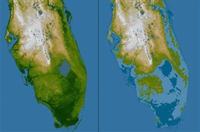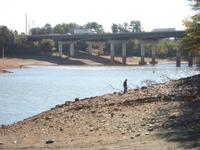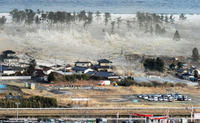-
Past experience shows that Earth can recover from global warming

When faced with high levels of atmospheric carbon dioxide and rising temperatures fifty-six million years ago, the Earth increased its ability to pull carbon from the air;this led to a recovery that was quicker than anticipated by many models of the carbon cycle — though still on the order of tens of thousands of years, a new study finds; researchers found that more than half of the added carbon dioxide was pulled from the atmosphere within 30,000 to 40,000 years, which is one-third of the time span previously thought
-
-
Computerized irrigation system saves money

The University of Michigan is using a computerized irrigation system for its campus landscaping; the system uses information from a campus weather station that monitors wind speed, rain, temperature, and humidity to adjust irrigation schedules; the system allowed the school to reduce the amount of water used on irrigation by 22 million gallons of water on landscape irrigation each year — or 68 percent relative to the amount of water used before the system was installed — saving an estimated $141,000 a year
-
-
New material cleans water of radioactive contamination
NC State researchers develops material to remove radioactive contaminants from drinking water; the material is a combination of forest byproducts and crustacean shells; the new material not only absorbs water, but can actually extract contaminates, such as radioactive iodide, from the water itself; this material, which forms a solid foam, has applications beyond radioactive materials
-
-
Modeling shows limited spread of Fukushima's radioactive release in ocean
Daily computer simulations are suggesting that, so far, the hazardous radioactive materials being released into the sea by the Fukushima nuclear plants are still largely restricted to areas near the coast; the powerful Kuroshiro current — the Pacific’s version of the Gulf Stream — tends to block contaminated seawater from flowing southward toward Tokyo Bay while picking up little contamination itself
-
-
Heavy snows divert Colorado River water shortage, for now

This winter, heavy snowfall in Utah, Colorado, and Wyoming have helped to avert a water crisis along the Colorado River; after an eleven year drought in the region, residents have begun to worry about impending water shortages; the Colorado River supplies nearly thirty million people in seven states with drinking water as well as Mexico; the heavy snows could bring only a brief moment of respite; with demand exceeding supplies and with each year bringing less water, there is potential for a future disaster; if supplies continue to decline, water deliveries will be reduced when Lake Mead’s water level drops below 1,075 feet; as of 1 February, Lake Mead’s water level was at 1,091feet
-
-
Artificial clouds to help keep 2022 World Cup cool
Tiny Qatar will be the host of the 2022 Soccer World Cup; trouble is, temperatures in June and July can reach up to 50C (122F), leading to worries about the health effects of players and spectators; Qatari researchers say they have a solution: artificial clouds; the clouds are made from a lightweight carbon structure, and carry a giant envelope of material containing helium gas; four solar-powered engines move the structure via remote control
-
-
Rising seas and coastal risks

Most scientists believe that melt water from glaciers, the Greenland ice sheet, and possibly the West Antarctic ice sheet, along with thermal expansion from warming oceans, will raise sea levels by one-half to one meter (1.6 to 3.2 feet) over the next century and by one meter to two meters (6.5 feet) over the next 200 years; if sea level rises by a meter, “we will see higher tides, higher tidal velocities and tidal inundation every day,” says one expert; “And we’ll have a different shoreline”
-
-
UN warns of potential food crisis
A UN Food and Agriculture Organization official warned that countries are not doing enough to increase food production to meet rising demand and that the world could be headed for a global food crisis; global food production must rise by 70 percent in order to meet the estimated demand for food; food prices have already soared in recent months and in 2010 food prices increased by 25 percent; rising prices sparked food riots in Egypt and Tunisia, which contributed to the overthrow of their governments; large disasters and droughts have significantly reduced crop yields across the world; as supply has fallen, demand has spiked due to population growth and increased use of food to manufacture biofuels
-
-
After EPA fine, mining company building $200 million water treatment plant

America’s largest underground coal mining company, Consol Energy, is constructing a $200 million water treatment plant in West Virginia, after being fined $5.5 million by the Environmental Protection Agency (EPA); in 2009 discharge from Consol’s mining operation caused a toxic golden algae bloom that killed aquatic life along thirty miles of Dunkard Creek; the advanced waste water treatment plant will be the largest facility in Appalachia; the plant will be capable of treating 3,500 gallons of water per minute and will remove more than forty-three tons of dissolved solids, including eleven million pounds of chloride
-
-
Drought-prone pasts may foretell New York's and Atlanta's futures

By fall 2007, during the second year of a three-year drought, Atlanta had roughly three months’ supply of water remaining while Athens, Georgia was down to approximately fifty days; another drought dramatically lowered New York City reservoirs to 33 percent of capacity in 1981; droughts in those cities and their surrounding regions were typically longer and more frequent centuries ago than they were for most of the twentieth century; a return to historic climate patterns would bring more frequent and prolonged droughts
-
-
Oil industry creates center for off-shore safety
Following several accidents on off-shore oil rigs, the U.S. oil and gas industry will launch a center dedicated to investigating safety issues related to off-shore drilling; the center will be operated by the American Petroleum Institute (API) but will be walled off from the trade group’s lobbying work
-
-
Past "hyperthermals" offer clues about anticipated climate changes
Bursts of intense global warming that have lasted tens of thousands of years have taken place more frequently throughout history than previously believed; most of the events raised average global temperatures between 2° and 3° Celsius (3.6 and 5.4° F), an amount comparable to current conservative estimates of how much temperatures are expected to rise in coming decades as a consequence of anthropogenic global warming; most hyperthermals lasted about 40,000 years before temperatures returned to normal
-
-
Sensors detecting nuclear tests detect tsunamis, too

The Comprehensive Nuclear test-Ban Treaty (CTBT) is supported by arrays of sensors at sixty sites across the world that listen for the low boom of atmospheric blasts. They are tuned to infrasound — frequencies under 20 hertz (cycles per second), the lowest humans can hear; these sensors are meant to pick up illicit nuclear tests, but they can also pick up tsunami-producing tremors — and provide timely warning to those likely to be affected
-
-
NOAA scientists cleared of wrongdoing in email scandal
A recent investigation by the Commerce Department’s Inspector General has cleared the National Oceanic and Atmospheric Administration (NOAA) of any wrong doing in a recent scandal over an email exchange with British academics; in 2009 more than 1,000 emails between NOAA scientists and the Climatic Research Unit at the University of East Anglia in the United Kingdom were stolen; the emails suggested that scientists had manipulated results and thrown out faulty data; the recent report exonerates the scientists of any wrongdoing, and several British reviews have already cleared the name of British scientists
-
-
Mitigation policy could halve climate-related impacts on water scarcity
Even without the effects of climate change, as much as 40 percent of the world’s population will be living under water scarce conditions by 2020; climate change is expected to influence future water scarcity through regional changes in precipitation and evaporation; most climate models suggest rainfall is likely to decrease in the subtropics and increase in mid-latitudes and some parts of the tropics; in the latter, mitigation efforts could actually reduce the amount of extra water potentially available
-
- All
- Regional
- Water
- Biometrics
- Borders/Immig
- Business
- Cybersecurity
- Detection
- Disasters
- Government
- Infrastructure
- International
- Public health
- Public Safety
- Communication interoperabillity
- Emergency services
- Emergency medical services
- Fire
- First response
- IEDs
- Law Enforcement
- Law Enforcement Technology
- Military technology
- Nonlethal weapons
- Nuclear weapons
- Personal protection equipment
- Police
- Notification /alert systems
- Situational awareness
- Weapons systems
- Sci-Tech
- Sector Reports
- Surveillance
- Transportation
Advertising & Marketing: advertise@newswirepubs.com
Editorial: editor@newswirepubs.com
General: info@newswirepubs.com
2010-2011 © News Wire Publications, LLC News Wire Publications, LLC
220 Old Country Road | Suite 200 | Mineola | New York | 11501
Permissions and Policies
Editorial: editor@newswirepubs.com
General: info@newswirepubs.com
2010-2011 © News Wire Publications, LLC News Wire Publications, LLC
220 Old Country Road | Suite 200 | Mineola | New York | 11501
Permissions and Policies
